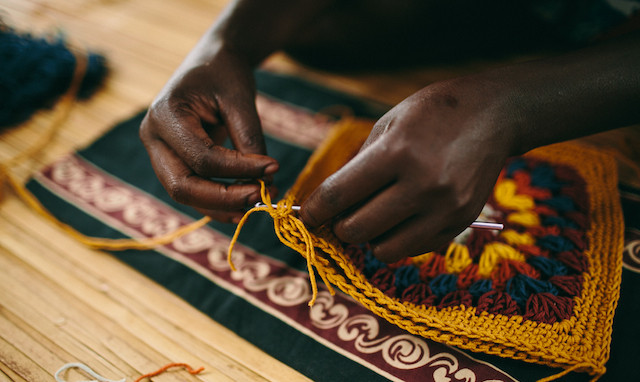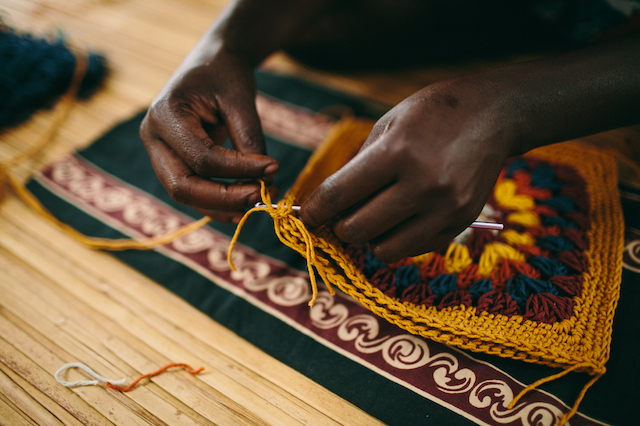By Daphne Auza
At first glance, crochet seems like a relatively simple handicraft, considering yarn and a hook are the only materials required to produce a variety of garments. They hardly look like tools that have led to the empowerment of more than 150 women throughout Northern Uganda and Peru. Since gaining a nonprofit status in January 2008, the people behind Krochet Kids Intl. have dedicated themselves to creating job opportunities for impoverished individuals in developing countries.
Through an online store, Krochet Kids Intl. sells a variety of crochet products – from bags to beanies to bow ties — handmade by the beneficiaries of the organization’s sustainable economic development program. Each product’s label contains the signature of the woman who made it, allowing customers the opportunity to write personal thank-you notes through the organization’s website. However, Krochet Kids’ work consists of more than employing their beneficiaries and teaching them the craft of crochet. The education and mentorship components of the program aim to help workers and their families secure a livelihood beyond Krochet Kids Intl.
Each product sold by Krochet Kids Intl. has a story behind it. Co-founder Kohl Crecelius emphasizes how this personal connection helps customers understand the diverse experiences of impoverished individuals from developing countries.
“It [the personal connection] helps people understand that our products are made by people,” Crecelius said about the hand-signed garments. “We do not think about this often enough, as we just seek for the lowest cost items we can find. We don’t think about the impact the clothing we buy has on the people who made it.”
The organization had its humble beginnings in the northwest region of the United States, where friends Stewart Ramsey, Travis Hartanov and Kohl Crecelius had taken up crochet after Kohl’s older brother exposed them to the craft. The trio expanded their hobby into a small business, dubbing themselves the Krochet Kids. They had yet to realize the potential of turning their longtime hobby into a socially responsible business model until they began to attend separate universities and volunteer abroad during breaks.
Their experiences abroad, particularly in Northern Uganda, opened their eyes to the problematic aspects of humanitarian aid. Ramsey discovered communities that were tired of civil war and depended too much on foreign money. The three friends returned to Uganda together, and while there, they began teaching a group of women crochet in exchange for their personal stories. Many of the women expressed the desire to create opportunities for themselves, a perspective contrary to the widespread misconception that the poor of developing countries lack the capabilities to improve their situation.
The three friends continued to work with these women and eventually their noble hobby evolved into something much greater than they could have ever imagined.
To recruit beneficiaries, local Krochet Kids Intl. staff members collaborate with other organizations and local officials to identify potential candidates. They visit the homes of these individuals to conduct a baseline assessment, ensuring that they will help women who will benefit the most from the program. The organization commits to training the women in personal budgeting, saving, loaning and business management topics for a minimum of three years. Each beneficiary is also assigned a mentor who will help her develop the knowledge she needs to empower herself and contribute the local economy.
Krochet Kids Intl. aims to make long-lasting impact. To track their beneficiaries’ overall progress, they measure their success along many small variables such as income, meals and savings. They work with the community in choosing and estimating various poverty indicators so that their program remains locally relevant.
“Too often people want a simple solution to making an impact or ‘changing the world’ through their purchases,” Crecelius said. “But the truth of the matter is that poverty is a very complex thing and it is not solved by a single need or through a single interaction.”
Early this past year, Krochet Kids Intl. launched a Cut and Sew Initiative in Peru. They were interested in diversifying their products and testing their theory of change in a new context. One thing that definitely did not differ from Northern Uganda was the presence of women who wanted to have their stories heard.
Since then, Krochet Kids Intl. products have grown to include scarves, bags and shirts as well as beanies. All of these garments are made from materials indigenous to the regions of the women. Crecelius points out that unlike other clothing lines, the organization will never sacrifice its ethical business model, which sources materials from local industries. “My hope is that we can serve as a model for how nonprofits can create sustainable funding sources through great products and branding, as well as help businesses re-think their production practices.”
 ABOUT THE WRITER
ABOUT THE WRITER
Based in Los Angeles, Daphne Auza is a current student at Occidental College pursuing a major in English and Comparative Literary Studies. Her interests lie in travel, poems, and the intersection between the arts and social justice, but her curiosity extends far beyond those realms as well. She likes to think that many of her passions are founded on her seemingly insatiable restlessness. You can check out her daily musings and other writings at candidkandu.tumblr.com.




